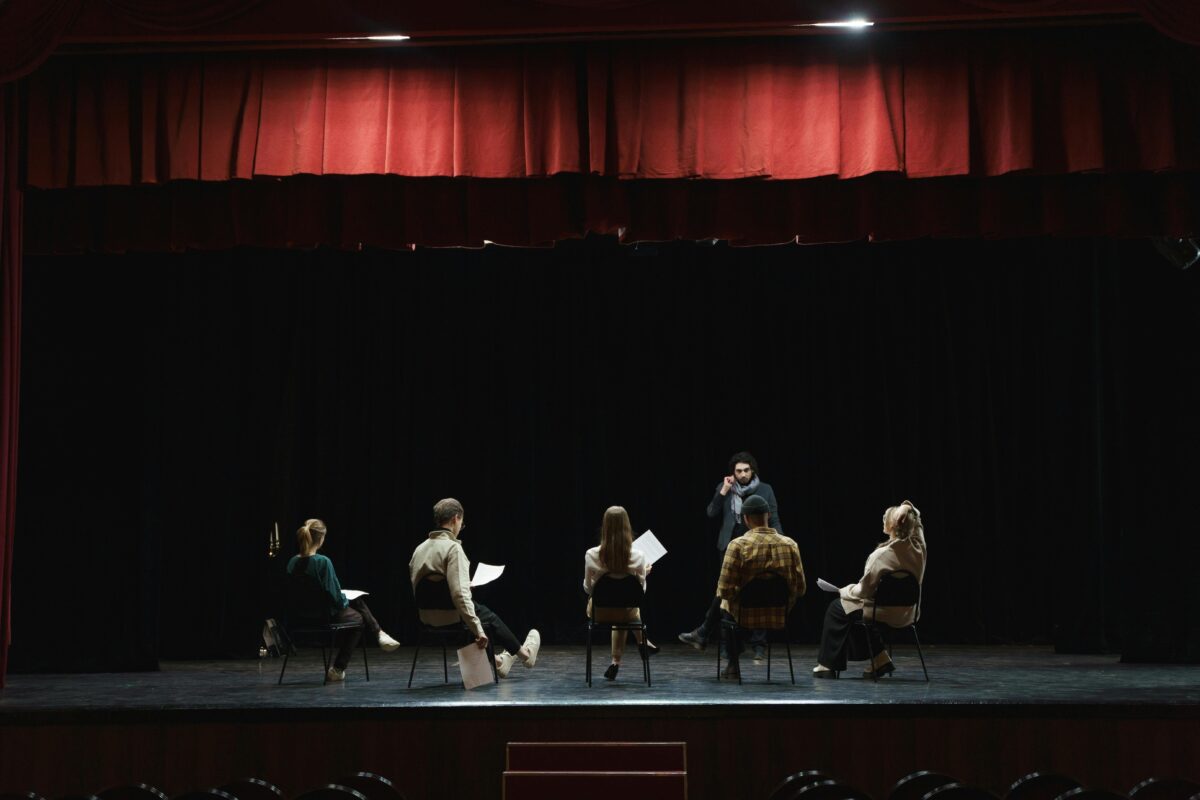In any actor’s training, acting classes serve as the foundation. What they do is give students an understanding of how to play a role confidently and realistically. The two integral components of acting classes include scene study and character development. By doing this, actors bring their scripts alive and make them look like real dynamic characters on stage. The following is how acting classes incorporate these essential elements.
Scene Study:
- Script Analysis: This is the first step in scene study. At drama school, students learn how to analyze a script so that they understand its plot, themes as well as what motivates the characters involved. They find out the objectives, obstacles and tactics within a scene. This enables actors to dissect subtexts by their lines in order to imbibe depth into their performance.
- Emotional Preparation: The significance of emotional preparation is emphasized in acting classes. Instructors teach learners techniques on how they can touch with their emotions using personal experiences for it brings forth truthfulness in whatever roles they may be playing. There are exercises that help actors feel the emotions portrayed by their character such as emotional recall among others; and also sensory work helps get into the shoes of your character in terms of feelings and circumstances around them.
- Partner work: In scene study, often students are required to partner closely with the scenes of that play in acting classes to create a platform where the students can be able to train thus giving an opportunity for them to listen and act like their true partners. The approach is collaborative in nature and hence allows actors to realize how relationships work in different scenes and respond accordingly.
- Rehearsal Techniques: Rehearsal is one of the most crucial parts of any scene study. In order to perfect their performance, acting classes use various rehearsal techniques. These may involve improvisations that will help in trying out different ways of presenting the scene while blocking offers insights on physical movements as well as repetition which make it easier for an actor to internalize lines and actions.
- Feedback and Critique: Receiving feedback is important for growth. Students receive constructive criticism from their acting teachers aiming at making them perform better. Another way through which learning becomes collaborative is through peer feedback which are also encouraged among learners who share this stage together. Through this exercise, actors are able to refine their performances by discovering new aspects concerning their characters.
Character Development:
- Character Research: Understanding the background, personality, and motivations of a character lies in understanding the character development process. Acting classes will equip students with enough information to be able to research their characters effectively. This can include studying the historical and social context of the script, analyzing the character’s relationships, and imagining their life beyond the written lines.
- Physicality and Voice: Character development involves more than simply understanding a character’s internal life but also embodying them physically as well as vocally. Inside acting classes there are exercises that help pupils to develop unique physical and vocal qualities for their characters. Change in posture; movement patterns or perhaps experimenting different accents or speech rhythms might be involved.
- Psychological Approach: Psychological methods used by acting students for bringing out a real character are manifold. For instance, Stanislavski’s “What if” or Uta Hagen’s nine questions enable actors to deeply think about their characters’ motivations and actions. Backstage has these techniques done through asking oneself “what would I do if put in this situation?” It is possible to create a portrayal which is not only believable but also nuanced by actors who ask themselves such questions.
- Improvisation: The development of a character mainly depends on improvisation. Improvisational exercises are often used in acting classes to help students understand their characters under different situations. This kind of off-the-cuff approach enables actors to discover new dimensions of the roles they play and also react naturally at that particular point in time.
- Building a Backstory: In acting, one common tradition entails creating detailed backstories for characters. This backstory encompasses the history, major life events, and personal relations of a character. By developing a complete backstory, an actor is able to make better choices and has more fulsome performances.
- Emotional Connection: Emotional connection is one thing taught during acting classes. This includes being able to personally identify with the character’s feelings and circumstances. Method acting techniques such as encourage the actors’ use of their own emotional experiences in order to give realistic portrayals.
Integrating Scene Study and Character Development:
This is where the magic of acting really happens, when scene study is integrated with character development. Acting classes provide a safe environment where actors can experiment, make mistakes, and grow. They learn to bring their characters alive within the context of a scene by doing it repeatedly while being given feedback.
- Rehearsal and Performance: During rehearsals and performances in acting classes, students apply their character development work in scene study. This comprehensive approach guarantees that their characters are coherent and fully developed throughout the whole play. When they rehearse, actors have to maintain the physiques, voices as well as emotional truth associated with their partners in a play.
- Adaptation and Flexibility: From acting classes; students gain adaptability to different circumstances which they may face in future studies or working environments. Accordingly, they modify performances for directors without losing sight of who they were at first imitation of the same piece of work earlier on adjusted after receiving notes from a director on how it could best be improved. This ability gives them an edge over others specifically when one is employed in professional settings where the boss might want something else later on.
- Reflection and Refinement: Reflection is a vital element of the process of learning in acting classes. Students are urged to reflect on their presentations, pinpoint areas that need correcting and chart out ways to improve themselves. This constant reflection and reforming assist actors to continue growing and refining their art.
In conclusion, acting lessons are very important when it comes to teaching scene work as well as character development. Some of these skills include script analysis, emotional preparation, physical/vocal work, improvisation and feedback so that students can learn how to develop real characters with intriguing performances. These primary abilities are necessary for every actor who wants to succeed in the rigorous world of performing arts.



